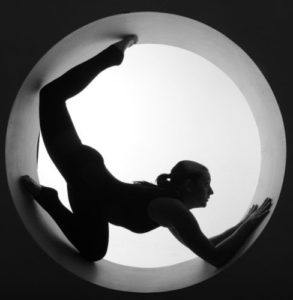Inhabiting Ourselves (Excerpt)
February 1, 2017Podcast: Download (Duration: 4:44 — 4.3MB)
Subscribe: More
 Have you ever had an alien invade your body?
Have you ever had an alien invade your body?
By the time I entered the 8th month of pregnancy I definitely felt a little invaded. Both my babies have been very active in utero, and so by this point in the pregnancy I spent much of my time…well, let’s say noticing this being that had taken over my body. An elbow here, a foot there; they made their presence known, and in a way I couldn’t ignore.
And of course, they really did take over my body—not just as a kind of parasitic organism (although let’s be honest, that’s not a bad description), but also in the way that much of the time I was pregnant I spent thinking about my body, which was really thinking about the baby, about what she needed, whether she was safe and when she would arrive. A very pregnant colleague said to me the other day, “I find it so strange not to know when my body will suddenly take over my life.”
Pregnancy can certainly bring a heightened awareness of how we are at the mercy of our bodies. But the truth is, pregnancy is not, by far, the only state that reminds us of this fact. All of us are at the mercy of our bodies, these vessels that transport us through life and, eventually, lead us out of life, too.
For some of us, our bodies are a source of pleasure and pride, doing what we want them to when we want it, carrying us on strong legs and at just the pace we like. For others of us—perhaps for most of us—our bodies have been at times a source of disappointment, or fear, or pain, or even self-hatred.
Or a source of denial. Plenty of us go through times when we just try to ignore our bodies, ignore the aches and pains, even their mere existence. As inheritors of the Western philosophical tradition, we have our own tendency to separate the life of the mind from the life of the body, to imagine that we are beings that can exist on a purely cerebral level without the annoying hang-ups of our bodily forms.
To which I say: How’s that going for you?
We have yet to evolve into creatures with giant brains and little wispy tails of being, as one might see in a science fiction movie. We are instead people with decidedly physical natures, and no matter how much we may pretend, those physical natures are a huge part of what makes us who we are, what makes us human.
My favorite passage in Eve Ensler’s The Good Body is from a monologue given by a Masai woman.
Do I like my body? Do I like my body? I love my body… My fingers, look at my fingers. I love my fingernails, little crescent moons. They lead right up to my arms—so strong—they carry things along. And my legs, my legs are long. Masai people, we are tall, I get there fast…. Look at that tree. Do you see that tree? Now look at that tree. (Points to another tree.) Do you like that tree? Do you hate that tree ‘cause it doesn’t look like that tree? Do you say that tree isn’t pretty ‘cause it doesn’t look like that tree? You’re a tree. I’m a tree. You’ve got to love your body… You’ve got to love your tree. Love your tree.
Our trees, our bodies, are uniquely our own. They carry in them the stories we have lived, the struggles we’ve experienced. They also carry in them the care we show them, the way that we feed and nurture them, the way we parent them. No body is perfect. Some feel further from perfect than others, I know. I have had my own share of journeys with this body, but I’m still aware that it functions very well.
Some of us have bodies that don’t function well at all, which can make getting through the day difficult. Some of us have bodies that let us down in big ways, that are subject to diseases and experiences that are exhausting and painful. And all of us—all of us—have bodies that will not last forever.
But we also only have this one body, this one vehicle to get us through life. And the fact that it gets us around at all still seems to me to be something worthy of our thanks and our compassion.
More interestingly that all of that, though, Amanda is a country music fan, a mother of two daughters, married to a government lawyer, and an avid enjoyer of coloring books. She uses colored pencils only, because the permanence of markers scares her.
- Courage for the Resistance…and the Relationships - February 1, 2020
- Inhabiting Ourselves (Excerpt) - February 1, 2017
Quest Monthly Print Edition
Recent Issues
Latest Spiritual Reflection Posts
Weekly Newsletter
About
Quest for Meaning is a program of the Church of the Larger Fellowship (CLF).
As a Unitarian Universalist congregation with no geographical boundary, the CLF creates global spiritual community, rooted in profound love, which cultivates wonder, imagination, and the courage to act.
Contact
Church of the Larger Fellowship Unitarian Universalist (CLFUU)
24 Farnsworth Street
Boston MA 02210

